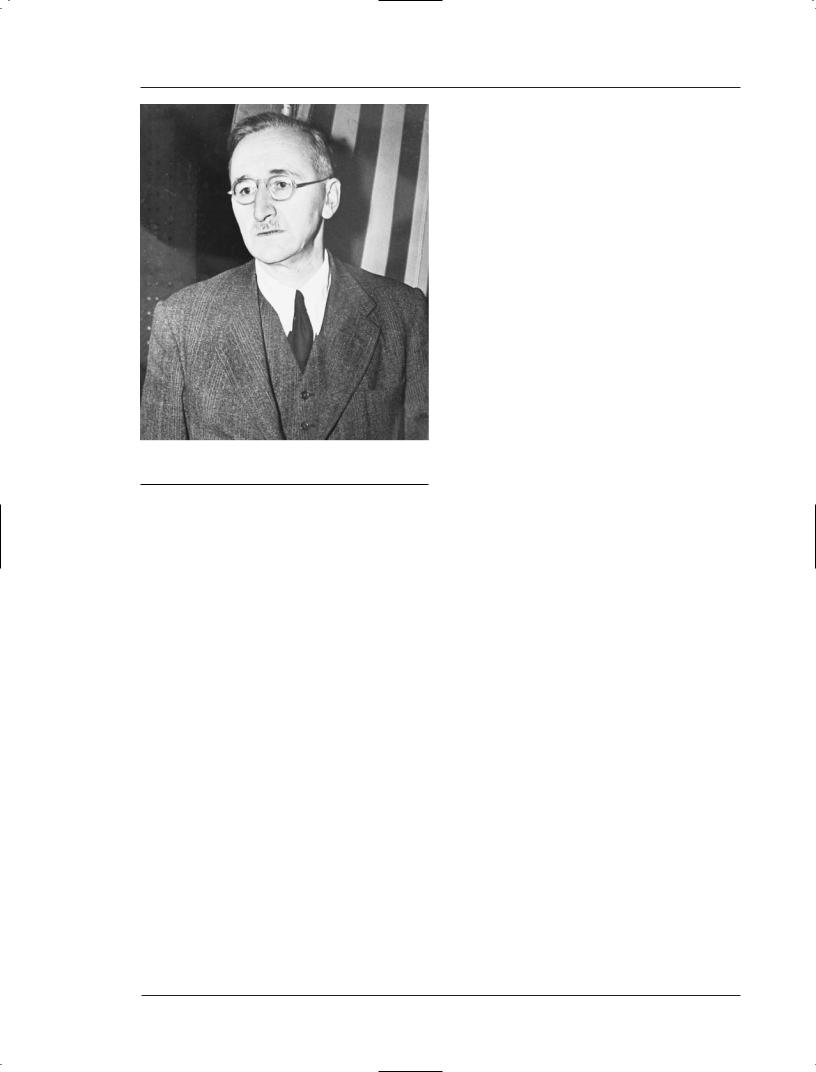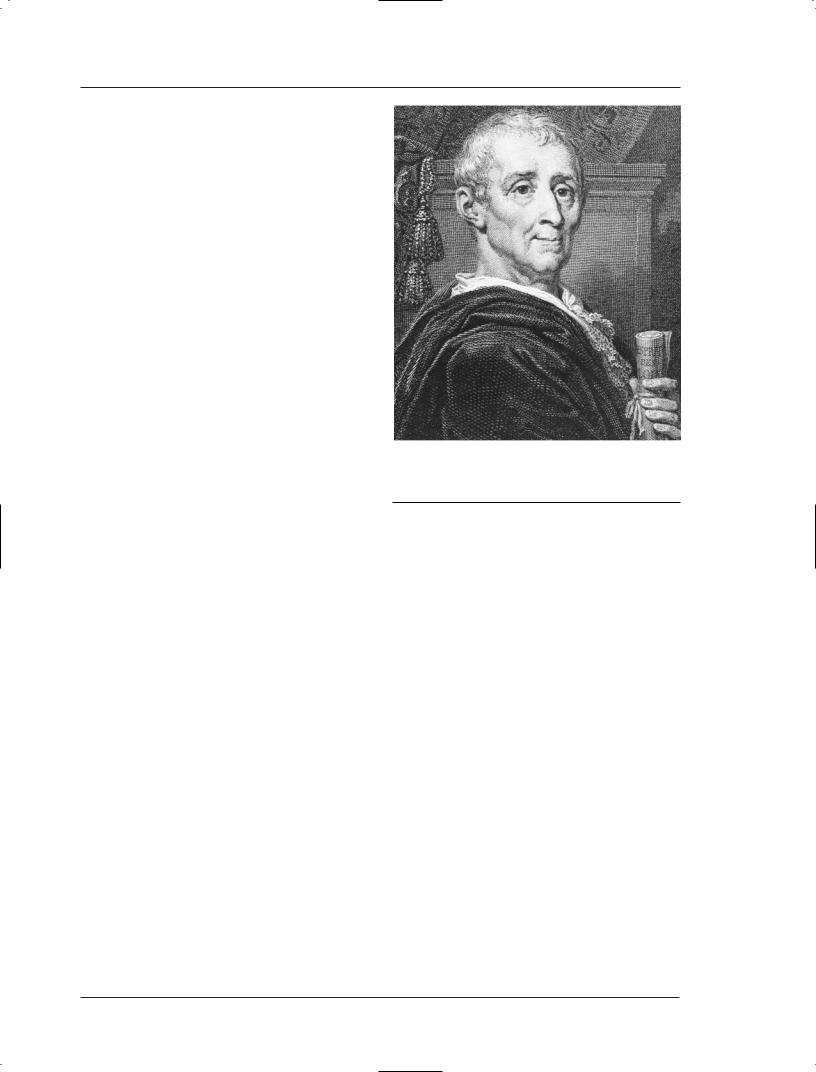
Political Theories for Students
.pdf
L i b e r a l i s m
CHRONOLOGY
1670: Benedict de Spinoza’s A Theological–Political Treatise is published
1688: The Glorious Revolution occurs in England
1748: Baron de Montesquieu’s The Spirit of the Laws is published
1779: Jeremy Bentham’s Introduction to the Principles of Morals and Legislation is published
1786–1788: The Constitutional Convention is held in the newly created United States of America
1868: William Ewart Gladstone becomes the Liberal Party Prime Minister of Great Britain
1869: John Stuart Mill’s On Library and The Subjection of Women are published
1962: Milton and Rose D. Friedman’s Capitalism and Freedom is published
1971: John Rawl’s A Theory of Justice is published
1992: Democrat Bill Clinton is elected President of the United States
Liberalism can be understood as a political tradition that has varied in different countries. In England, the birthplace of liberalism, the liberal tradition in politics has centred on individual rights, religious toleration, government by consent, and personal and economic freedom. In France, liberalism has been more closely associated with secularism and democracy. In the U.S., liberals often combines a commitment to personal liberty with an antipathy to capitalism, while liberals in Australia tend to be much more sympathetic to capitalism, but often less enthusiastic about the state defending civil liberties.
HISTORY
Liberalism is a doctrine that emerged from the European Enlightenment of the eighteenth century. It became particularly strong in England, but also in the U.S., France, and later, other Anglophone societies like Australia. In each of these countries it assumed slightly different forms.
The major philosophers of liberalism belong to a number of groups of theorists. The first includes several theorists of the seventeenth and eighteenth centuries who preceded liberalism proper but who anticipated its doctrines. These were followed by the political and economic theorists of classical liberalism in the mid–nineteenth century. Later, other liberal theorists modified those doctrines of the classical liberals and are often called “social liberals.” There also emerged in the twentieth century defenders of classical liberalism including, in the economic sphere, the “Austrian School.”
A History of Liberal Theory: The Precursors of Liberalism
Until the seventeenth century, most European political philosophy was chiefly set in theological terms. One of its principal concerns was the achievement of God’s will on earth and the protection of the Christian religion.
The Enlightenment was an intellectual movement during the eighteenth century which believed humans had the ability to discern truth without appeal to religious doctrine. This marked: the beginning of scientific history; the need to justify doctrine by reason; freedom is necessary to advance progress; historical criticism as necessary to determine the historical legacy; the need for critical philosophy; and the use of ethics as separate and independent from the authority of religion and theology. It also entailed a suspicion of all truth claiming to be grounded in some kind of authority other than reason, like tradition or divine revelation.
In his Critique of Pure Reason (1781) the leading German Enlightenment philosopher Immanuel Kant (1724–1804) asserted all that can be known, is things as they are experienced. Other Philosophers attempted to know God as he is in himself by reasoning up to Him. This was, according to Kant, a vain attempt. God could not be experienced by man. Kant did not entertain the possibility that God could break into the realm of history and reveal himself.
But Kant was not an atheist. He postulated the existence of God, but denied the possibility of any cognitive knowledge of him. It was man’s conscience that testified of God’s existence, and He was to be known through the realm of morality. Kant published another work, Religion Within the Limits of Reason Alone
(1793), which set forth his conception that religion could be reduced to the sphere of morality. For Kant, this meant living by the categorical imperative— which he summarized in two maxims: “Act only on that maxim whereby thou canst at the same time will
1 7 2 |
P o l i t i c a l |
T h e o r i e s |
f o r |
S t u d e n t s |

L i b e r a l i s m
that it should become a universal law”; and “Act as if the maxim of thy action were to become by thy will a universal law of nature.”
In other words, every action of humanity should be regulated in such a way that it would be morally profitable for humanity if were elevated to the status of law.
The Federalist Debates and the U.S. Constitution
In terms of political philosophy, the defining moment of the seventeenth century was the English Revolution. The two revolutions at the end of the eighteenth century, in America and then in France, established substantial monuments to the intellectual debates about constitutionality. The Thirteen Colonies in America revolted against the English Crown and enforced their Declaration of Independence (1776) in a revolutionary war. There then ensued debate among and between the former colonies about what system of government should prevail. This was resolved at the Constitutional Convention in Philadelphia, 1786–1787, in favor of the Federalists.
What form of government best suited a commercial civilization in the New World? Somewhat ironically, the British Constitution figured largely in discussion of that issue because the Americans appreciated that the British, whatever their other failings, had made most progress in that respect. The interpretation Baron de Montesquieu (1689–1755) and the founding fathers of the American state placed on the English Constitution, was that the separation of powers limited the power of the state and should be adopted as a principle of American government. The next great debate concerned which interests could be represented, and this was progressively resolved in favor of universal franchise in the New World, and then in the other liberal states.
Montesquieu has been called “the godfather” of the American constitution. In eighty–five Federalist Papers, 1787–1788, Montesquieu’s temper and spirit is omnipresent and is often cited by anti–Federalists and Federalists alike. The anti–Federalists contended that Montesquieu had argued that a republic which extended over too large a territory would come unstuck. The Federalists, led by Alexander Hamilton (1757– 1804) and James Madison (1751–1836), responded by arguing that Montesquieu had seen that the way to overcome this was to establish a confederation of republics. They also cited Montesquieu that representation should be proportional to the size of the population.
Madison said that Montesquieu “has the merit of displaying and recommending” the doctrine of the sep-
aration of powers “most effectually to the attention of mankind,” but also that politics is about the institutional balancing of social forces. That very approach to the problem of politics explains the extremely different character of The Federalist Papers from the Declaration of Independence. The Declaration, penned by Thomas Jefferson (1743–1826), is a general statement about rights and love of freedom. Jefferson’s politics was essentially driven by a republican conception of honor, by a deep faith not only in man, but in revolutionary action itself, by a mistrust of commercial society, by a desire to preserve an agrarian economy, and by an essentially populist distrust of institutions. Despite this, he nonetheless kept slaves.
The concerns of Hamilton in The Federalist Papers were different and governed by the desire to create peace and commercial prosperity, to provide a strong industrial base for America and thus to make her a strong military power, to provide institutions which could mediate conflict by providing a balance between local and national interests. He was as practical as Jefferson was romantic, and was as afraid of democratic abuses as of monarchical abuses. Hamilton’s republicanism was not borne out of a belief in high minded ideals, but out of the reality of the American situation. Ultimately Jefferson’s charge that Hamilton was a monarchist amounted to Hamilton’s seeing the need for a head of state to have executive powers, which were not reducible to the powers of the legislature. Hamilton was a follower of Montesquieu, but not of the British monarchy.
The delegates to the Constitutional Convention, of course, had a restricted conception of the scope of proper interests, being themselves almost exclusively slave–owning southerners or wealthy northern merchants. The constitution they created was not primarily intended to be democratic and it restricted the franchise to property–owning males, thereby excluding women, the working classes and the slaves from the political community. But nonetheless they did embody in the new Republic’s political system the notion that legitimate interests would conflict and needed a process of resolution.
The solution of the Federalists was not one which guaranteed immediate liberties for dominated social groups. It was, however, one which was able to provide a compromise between the strongest interests of the day, by taking the strongest interests in the New World vying for political power and forging a new political system. This would provide: a strong defensive capacity; a strong central government, able for the most part to provide commercial and political stability for a vibrant industrial society; and a form of
P o l i t i c a l |
T h e o r i e s |
f o r |
S t u d e n t s |
1 7 3 |

L i b e r a l i s m
government in which local interests still had strong representation, and in which more people than ever in history had freedom.
This solution, then, did not lay in a political elimination of the diversity that sprang from the dispersal of interests, talents, desires, and sentiments, but of realizing that a large distribution of interests would, in general, counteract the danger of factionalism itself. “Extend the sphere, and you take in a greater variety of parties and interests; you make it less probable that a majority of the whole will have a common motive to invade the rights of other citizens.” Or break the society “into so many parts, interests and classes of citizens that the rights of individuals, or of the minority, will be in little danger from interested combinations of the majority.”
This argument was also a way of defending the Federalists program of a confederate republic. For a confederate republic would also aid this process of dispersion by adding another geographical layer to the interests that would be formed at either a local or state level. Thus linkages of interests could be formed between social groups, which constituted a minority in some states while being a majority in others. Further, alliances of social interests cutting along geographical lines would tend to protect minority groups. At the same time, interests based upon geographical factors might take on greater relevance at one time, while at another time, social factors which were operating nationally may dominate. The great value of Confederalism, then, was that the polymorphic nature of factionalism would aid the minority.
But while the Federalists argued that the large territory of America combined with “the multiplicity of interests” made it highly unlikely that a majority would pursue a common and unjust cause, that was only true with respect to those peoples included in the franchise. The lack of franchise would mean that those people without political representation—particularly indigenous Americans and slaves, and to a lesser extent women—could be endangered by a system in which they were just one interest among many, but lacked political rights. Thus it took almost eighty years and a war before the ambition articulated in the Jefferson Virginian Ordinance, that slavery be abolished, was realized. And the diversity of interests would not help the indigenous American as the railways moved West and the expansion of the frontier meant that Indians were driven off to reservations and treaties were routinely broken.
But the Federalists saw that there were numerous ways in which power could be congealed to the detriment of other interests. The majority could suppress
or rob the minority if they exercised legislative power. There was also simply the danger, recognized by Montesquieu, that the legislature would see any restraints upon its power as restrictive, as merely the resistance of vested minority interests. Because of the danger this created for the whole, the Federalists constantly emphasized the higher priorities that must guide the national government. But at the same time, the states serve as a useful buffer against the legislature’s tendency to over–extend. The Federalists thus found that the solution to balancing powers within the government had already been solved by Montesquieu and created a liberal if not wholly democratic constitution.
Alexis de Tocqueville and the American Example
A visiting Frenchman later found much to admire in the political system which the American Federalists had created, but also cause for concern. After visiting the U.S. in the early 1830s, Alexis de Tocqueville (1805–1859) returned to France and wrote Democracy in America:
Let us not turn to America in order to slavishly copy the institutions she has fashioned for herself, but in order that we may better understand what suits us; let us look there for instruction rather than models; let us adopt the principles rather than the details of her laws...
While Montesquieu had looked to Britain and urged the French monarchy to change its ways; Tocqueville urged republican France to follow America’s lead. Tocqueville looks to the New World for the most advanced constitutional arrangement.
In an 1848 speech to the French Chamber of Deputies, he warned that France rested on a volcano and that the working classes would overthrow the “foundations” upon which society rested unless property were distributed on more equally. But Tocqueville believed that social processes and change eventually resulted in political development and urged the extension of representation within a liberal state to encompass the enfranchisement of the working, non–propertied classes as was occurring in America. In the main, the U.S. had successfully combined individual freedoms with egalitarian social conditions. The two exceptions, for Tocqueville, were African and indigenous Americans. Women, on other hand, had a different situation and “although the American woman never leaves her domestic sphere and is in some respects very dependent within it, nowhere does she enjoy higher station.”
With the African and Native Americans, things were very different. “In one blow oppression has deprived the descendants of the Africans of almost all
1 7 4 |
P o l i t i c a l |
T h e o r i e s |
f o r |
S t u d e n t s |

L i b e r a l i s m
the privileges of humanity. The United States Negro has lost even the memory of his homeland; he no longer understands the language his fathers spoke...” This oppression was compounded by slavery. Native Americans had not been slaves, but they lived on “the edge of freedom.” Their life had been destroyed through the dispossession of their lands; their adoption of new tastes such as firearms, iron, brandy, and cloth, and the dwindling of wild game.
The progress that had developed in America, combining liberty and equality had, then, come at a terrible price for Blacks and Native Americans. Tocqueville saw the paradox that what is good and progressive is not good and progressive in all respects. America had opened up a future for the world, but had done so by robbing the Indians of their lands and enslaving African Americans. Slavery was also an economic liability.
But, in the main, America had managed a blend of the pursuit of private interests and public freedom. This blend did not mean that the American political institutions were perfect. But what mattered for Tocqueville was the overall liberty and well being for most of the inhabitants, based upon the core principle running through American society: each person is the best judge of his interests. In government, administration and in private life, this way of looking at things inculcated a dynamic, responsible, daring, and energetic spirit.
Unlike Karl Marx (1818–1883) and Jean–Jacques Rousseau (1712–1778), Tocqueville does not see inequality, as such, as a problem. It was only a problem if it was static, continually rewarded the idle rather than the industrious, and if it blocked the energies of the population. Tocqueville’s approach to inequality was pragmatic: it brings with it certain characteristics and incentives, but there is nothing valuable about it as such.
In America, says Tocqueville, the principle of the sovereignty of the people existed from the beginning of the colonies, even though “the colonies were still bound to the motherland.” While voting rights were restricted to certain classes of property holders, the democratic ethos was rife in the provincial assemblies. Thus when America revolted against the British, “the dogma of the sovereignty of the people came out from the township and took possession of the government; every class enlisted in its cause.” Even those classes which had most to lose from the expansion of democracy, were swept along with it in the revolution. It was, then, that bonding of classes against a common external enemy, combined with an ethos that had been introduced at the moment of colonization that made the establishment of American democracy so smooth.
At the time different states had various property qualifications for voting. But Tocqueville saw that the trend was toward eliminating restrictions and expanding the franchise. Democracy was an infectious political form suggesting that there is something intrinsically desirable about it for the majority of people. But that does not mean that it is a perfect form of government, or even the most adequate form of government for achieving a range of outcomes. Tocqueville saw that the egalitarian ethos of a democratic society carried a leveling tendency, but the leveling effect is seen by Tocqueville as eliminating the worst of the extremities which plague other regimes.
For Tocqueville, the most important negative in the trade–off between aristocratic and democratic societies consisted in the diminution of glorious achievements which tended to come when a society is placed in service to the ambitions, tastes, and talents of a group who see their talents, tastes, virtues, and actions as the raison d’être of society. But the most significant gain is the energy that gets unleashed through mass participation in political affairs.
Democracy does not provide a people with the most skilful of governments, but it does what the most skilful government often cannot do: it spreads throughout the social body a restless activity, and energy not found elsewhere, which, however little favored by circumstances, can do wonders. This is liberal doctrine.
Tocqueville, like the Federalists, feared the tyranny of the majority and believed that it was inevitable that the power of the majority would dominate. Tocqueville takes care not to say that American democracy is tyrannical, rather that there is no inherent political check against it. One problem was the instability of laws and public administration. Laws would be far more likely to be rapidly introduced and just as rapidly dropped, as some new idea took the public’s attention. The reformists’ energy was great in the United States, but projects were frequently left unfinished. A more insidious feature of the power of the majority, according to Tocqueville, was the power over thought. Whereas, says Tocqueville, in monarchies, the monarch is not able to compel moral authority, this is precisely the ground that the majority tries to occupy.
Tocqueville’s assessment of the inevitability of democracy, then, was matched by a cautious appreciation of the values of democratic society. The precarious balance achieved in America between liberty and equality was praised by Tocqueville. But he also grasped the tension that existed between them. America was fortunate in having the cultural roots which sustained this balance. Tocqueville knew that those
P o l i t i c a l |
T h e o r i e s |
f o r |
S t u d e n t s |
1 7 5 |

L i b e r a l i s m
Friedrich A. Hayek. (The Library of Congress)
roots were different from other countries, including France, which he saw were destined to go down the pathway of democracy. Thus there was a deep sense of foreboding that democracy would not be as smoothly established in the old world as in the new world, that there the pull toward equality could easily tip the balance toward an egalitarian despotism, as occurred under fascism.
The same dilemma was being grappled with in England. John Stuart Mill (1806–1873), who reviewed Democracy in America, praised it as the first philosophical book on democracy as it manifested itself in modern society. Mill was to evolve as the most important single advocate of applying the doctrines of liberalism, many of them already practiced in America, to Europe.
The Social Liberals
One of the most influential of the new liberals was the English academic Thomas Hill Green (1836–1882). Green did not, like Marx, propose a social revolution, but he did believe that a free society would only emerge if the state played a directing role in changing the social circumstances of men and women. In arguing for this, Green reformulated the most fundamental idea of liberalism, liberty itself. As he wrote in Liberal Legislation and Freedom of Contract in 1861:
We shall probably all agree that freedom, rightly understood, is the greatest of all blessings; that its attainment is the true end of all our efforts as citizens. But when we thus speak of freedom.... we do not mean merely freedom from restraint or compulsion. We do not mean a freedom that can be enjoyed by one man or one set of men at the cost of a loss of freedom to others.
Green’s position was expressed in the language of liberalism. Liberalism had arisen in opposition to the propertied classes being above the commercial class, not primarily in opposition to the classes beneath it. Although the commercial class had not wanted to spread political power to those who could soak its own wealth, the language forged in opposition to the aristocracy was the language of universality, right, equality, progress, as well as freedom. Freedom was only one of the variables in the political rhetoric that the emergent middle class had used in its political struggle. The rising working classes did not need another language in order to make its claims.
Green’s philosophical conception of freedom, then, was not contrary to the ideas already embedded in liberalism, in spite of carrying a freight that many liberals viewed as contrary to the kind of society they wanted to build based on private initiative free from paternal directions.
Furthermore, what also gave Green credibility was his emphasis upon the delivery of improved living standards. The core argument of liberal political economists had never simply been that freedom was good for the wealthy, but that in a liberal society wealth would be most speedily generated and more people would benefit than under any alternative economic system. It found its economic expression most famously in Adam Smith’s “invisible hand,” and was in Green’s time transforming the subject of economic inquiry by replacing political economy into neo–clas- sical economics. Green did not dispute the central tenets of this liberal political economy. The liberal tradition had provided a new benchmark for measuring the value of political arrangements: progressively advancing prosperity.
Closely related to this was the connection that had been established within the liberal tradition, between the value ascribed to property and the value ascribed to capacities or personal properties. Locke’s defense of private property rested upon the fact that a claim had been established through labor. In other words, private property was the expression, as Kant and then Hegel pointed out more clearly than Locke himself, of an action and an act of will. Madison had also spoken of “the diversity of faculties of men, from which the rights of property originate.” The “first object of
1 7 6 |
P o l i t i c a l |
T h e o r i e s |
f o r |
S t u d e n t s |

L i b e r a l i s m
BIOGRAPHY:
Friedrich A. Hayek
As the expansion of the state occurred, some liberal economic theorists warned that this would entail the destruction of liberal political economy on which the prosperity of modern society depended. The most influential of these philosophers were known as the “Austrian School”, and one of its most important members was Friedrich August von Hayek.
Friedrich A. Hayek was born in Vienna and studied at the University of Vienna, sitting in on von Mises’ classes. Hayek wrote on Monetary Theory and the Trade Cycle in 1929, which analyzed the effects of credit expansion on the capital structure of an economy. After emigrating to Great Britain in the early 1930s, Hayek became a British citizen in 1938. He lectured at the Fabian Socialist Centre and the London School of Economics (LSE), and his lectures were published in a second book on the Austrian Theory of the Trade Cycle, Prices and Production (1931). He was appointed Professor at the University of London as the LSE passed out of the Fabians’ control.
In London he argued with Keynes, and the Hayek–Keynes debate was one of the most important debates in monetary economics in the twentieth century. In his The End of Laissez Faire (1926), Keynes presented his interventionist pleas in the language of classical liberalism. As a result, Keynes was heralded as the “savior of capitalism,” rather than an advocate of inflation and government intervention.
Although Hayek was publicly defeated, he became involved in another grand debate in economic policy on socialist economic calculation. Hayek’s essays on the problems of “market socialism,” developed by Oskar Lange and Abba Lerner when answering Mises and Hayek, were collected and later appeared in Individualism and Economic Order
(1948). But again, Hayek appeared to lose the technical economic debate with the Keynesians concerning the causes of business cycles and, in view of the ris-
ing tide of socialism, his general philosophical perspective was increasingly labeled as a primitive version of liberalism.
Hayek, however, persisted. The problems of socialism he saw beginning to emerge in Britain led him to write The Road to Serfdom (1944). If socialism required the replacement of the market with a central plan, then, Hayek pointed out, an institution must be established to be responsible for formulating this plan. To implement the plan and to control the flow of resources, the state would have to exercise broad power in economic affairs. But in a socialist society, the state would have no market prices to serve as guides. It would have no means of knowing which production possibilities were economically rational. Further, those who would rise to the top in a socialistic regime would be those who liked exercising discretionary power and making unpleasant decisions. These people would run the system to their own personal advantage and destroy the freedom of society on which liberal economic prosperity depended.
Hayek at first achieved fame when young, but as the socialists gained popularity, the intellectual and political world moved away from his ideas. Nonetheless, he lived long enough to see his position recognized. Both Keynesians and socialists were eventually reduced by events, and Hayek became a key figure in the late twentieth century revival of liberalism.
He won his 1974 Nobel Prize in Economics, but also wrote about government intervention, economic calculation under socialism, and development of social structures. Although Hayek championed classic liberal economic policies of the late–nineteenth century, he also came to influence conservative politicians like Ronald Reagan and Margaret Thatcher. Hayek was awarded the Medal of Freedom in 1991 by U.S. President George Bush, and died the next year in Freibury, Germany.
government,” he said, “was the protection of these faculties.” With Mill the defense of liberty had for all its warnings about paternalistic government not primarily been an argument about protecting private property, but an argument about how personal capacities and energies would best flourish.
Thus the path has already been established within the liberal tradition for Green to emphasize that the job of the state is to equip its populace with the necessary skills for the exercise and development of their capacities. A state which fails to do this, thus becomes complicit in tyranny and the unfair preservation of
P o l i t i c a l |
T h e o r i e s |
f o r |
S t u d e n t s |
1 7 7 |

L i b e r a l i s m
privilege, in much the same way as the pre–liberal state had been complicit in the preservation of privilege for the select few. Private property, then, is justifiable only to the extent that it does not serve as a barrier to members of a particular social group developing their faculties. Green says because property is, “only justifiable as the free exercise of the social capabilities of all, there can be no true right to property of a kind which debars one class of men from such free exercise altogether.” For social liberal theorists like Green, “the people” must mean all of those who are capable of exercising their rights and who have not acted in such a manner that they may be legitimately deprived of them. But having the capacity to exercise their rights means that barriers to them must be removed.
In addition, the argument that the state should not intervene in a non–criminal contract freely entered into may seem to be a strong argument to the social liberal position. But as Green well knew, the liberal tradition had explicitly rejected the idea of voluntary entering into slavery. Rights were inalienable. Green, thus beginning from the invalidity of a contract of slavery, goes onto argue that “no contract is valid in which human persons, willingly or unwillingly, are dealt with as commodities, because such contracts of necessity defeat the end for which alone society enforces contracts at all.” Humans as rational beings should never be treated as means, because they are ends in themselves.
Green justified increasing state intervention, but did not see himself as a proponent of illiberal ideas. Protective labor legislation, public health and public education were justifiable, because they raise the well–being of those members of the population who otherwise would not be able to exercise their freedom or contribute to the public good.
The philosophy articulated by Green was built upon the synthesis of the liberal ideas of private power, the republican concern with the public good, and the egalitarian spirit of Rousseau. But it was also built in response to the social and political changes taking place in Britain. Late nineteenth century liberalism had become a doctrine as suspicious of the minority wealthy bourgeoisie, as seventeenth– and eighteenth–century liberalism had been of the aristocracy. The liberal politician Joseph Chamberlain (1836–1914) said in 1885 that “the great evil with which we have to deal is the excessive inequality in the distribution of riches.”
Liberal theorists in the twentieth century, with a few exceptions, continued further down the path of seeing the task of the state as providing the conditions for social justice. Invariably that meant restraining the
liberty of the wealthy. The best known exceptions to this were mainly economists, such as Ludwig von Mises (1881–1973) and Friedrich von Hayek (1899–1992). The Mises–Hayek Theory of the trade cycle—which Hayek formulated with the brilliant economist Ludwig von Mises—argued a “cluster of errors” characterizes the cycle. Excessive credit expansion occurs artificially lowering of interest rates that misleads businessmen who are led to engage in ventures that would otherwise have been unprofitable. This false signal produces poor coordination of production and consumption in society. This at first produces a “boom,” and then, later, a “bust,” as production adjusts to the real, and lower, pattern of savings and consumption in the economy. The intervention of government makes recessions worse.
Among philosophers the libertarian Robert Nozick also stands out. More typically, Leonard Hobhouse (1864–1929) in his classic twentieth–century defense Liberalism, 1911, said what all liberals had accepted, that “liberty itself only rests upon constraint.” He argued that “the function of the state is to override individual coercion” in order to maintain social justice and such rights as “the right to work” and the right to a living wage. Wealth and property were therefore treated as social goods.
THEORY IN DEPTH
Benedict de Spinoza
In seventeenth–century Holland, Benedict de Spinoza (1632–1677) became first modern philosopher to overtly defend political democracy. Spinoza’s philosophical starting point was the need to make a radical separation between theological scripture and philosophy: each one must be allowed to function without subordination to the other. This was a major problem for Spinoza and a central subject of his in A Theological–Political Treatise (1670). Spinoza’s political problem was largely, though not exclusively, centred around the problem of freedom of speech.
Spinoza saw himself as a philosophical scientist, and realized the issue of free speech could be a matter of personal survival. He knew that while he was safe in the commercial republic of Holland, because of the perceived dangerousness of his philosophy he was not at liberty to live in various other parts of Europe.
Spinoza believed that nature was governed by scientific laws. Spinoza’s understanding of all natural beings was premised on the simple idea that they are
1 7 8 |
P o l i t i c a l |
T h e o r i e s |
f o r |
S t u d e n t s |

L i b e r a l i s m
what they do. Nature is what it does, and what it does is its right. As he succinctly put it: “Whatsoever an individual does by the laws of its nature it has a sovereign right to do.” Thus Spinoza made a heretical equation that was to make his name a byword for infamy: the power of nature and the power of God are the same power.
The virtue of democracy, to Spinoza, was that it will create the strongest possible power. For the sovereign will be the people as a whole. Thus the act of transference is a mutual act of transference whereby the citizens are the body politic; they are not merely subjects, but they are reconstituted in their role as sovereign legislators. Interestingly, the very thing which most other democratic theorists fear, the excessive power of the people, is what Spinoza endorses when he defines a democracy as: “a society which wields all its power as a whole. The sovereign power is not restrained by any laws, but everyone is bound to obey it in all things; such is the state of things when men either tacitly or expressly handed over to it all their power of self–defense, or in other words, all their right.”
In this respect Spinoza endorses a radical form of democracy, because a democracy is least likely to ignore the pubic good, for it is its own good. A democracy is, in terms of Spinoza’s philosophy, dedicated to compromising between the different powers that can come into collision.
A democracy simply provides an opportunity for all the adult male sovereign powers to provide laws that enable them to pursue their interests in so far as that is feasible. Spinoza specifically excludes slaves, criminals, children, wards of the state, and women from exercising political power. Spinoza’s defense of democracy rests on a thoroughly realist foundation:
The object of government is not to change men from rational beings into beasts or puppets, but to enable them to develop their minds and bodies in security, and to employ their reason unshackled; neither showing hatred, anger, or deceit, nor watched by the eyes of jealousy and injustice. In fact, the true aim of government is liberty.
This was the first overt expression of the key philosophical doctrine of political liberalism.
In a democracy, freedom of opinion is vital for the people to discuss the advantages and disadvantages of any piece of legislation, thus enabling it to overturn old laws if their disadvantages outweigh their benefits. While, then, Spinoza indicates that no ruler is acting in his best interest if he suppresses free speech, in a democracy such a suppression would be most contrary to the best interests of the sovereign body itself.
While Spinoza was the first philosopher to provide an elaborate defense of modern democracy, he also provides a few of the hallowed conceptions usually associated with the great documents of liberal democracy. But Spinoza’s conception of rights and powers also deeply contradicts the notion of natural rights that is ingrained in the constitutional tradition and incorporated in such documents as the American Declaration of Independence and the French Declaration of the Rights of Man. The first modern political theorist who can be credited with providing a liberal as well as a democratic account of state theory was John Locke.
John Locke
The Englishman, John Locke, is generally regarded as being the first liberal thinker, although the term itself did not gain common currency until over a hundred years after his death. Previously, great political theorists had equated human nature with rapaciousness, only constrained by fear and force; Locke saw human nature as civil, reasonable, tolerant, and industrious, with its distribution of talents and opportunities being essentially equal.
Locke wrote Two Treatises of Government (published in 1690) in the context of the Glorious Revo- lution—which placed the House of Orange on the English throne—and the English Bill of Rights. For Locke, as long as one is not struggling to survive, there is a natural tendency to realize the advantage that comes from mutual respect of the rights of all to preserve their life, liberty, health, limbs, and goods. Locke does preserve a distinction between natural right and natural law, the latter of which is distinguished by its enforceability. But the legitimacy of that power derives from the right that everyone has to preserve their own basic rights. No one has the right to invade the rights of others, and “every one has the right to punish the transgressors of that Law (of nature) to such a Degree, as may hinder its Violation.”
Locke’s state of nature, with its original natural rights and fundamental human civility, crowned the parliamentary revolution by cementing the fiction that natural rights did indeed precede the formation of the state. And he does so by transforming the particular issue of the English nearly liberal transformation of the seventeenth century into a universal political theory. He adopted a virtual silence on the particular historical controversy, while providing a general theory in An Essay Concerning Human Understanding (written from 1671, published in 1689), which was derived from his experience.
The ahistoricism of his theory meant that it could be appealed to anywhere at anytime, and would later
P o l i t i c a l |
T h e o r i e s |
f o r |
S t u d e n t s |
1 7 9 |

L i b e r a l i s m
be transposed with great success as a defense for founding new institutions in America. But the disciple of Locke can also argue as if the institutional balances which were the product of over four hundred years of intense and often bloody struggles in England can simply be imposed on societies that have no organic dispositions toward liberal democracy. Locke does not present the state of nature as if it were built upon the English experience; rather, it is the experience of reason itself. Where respect for liberty prevails, he seemed to believe, so would prosperity.
For Locke, the danger to peace was not the grasping natures of men pursuing their own interests, but the rapacious behavior of the monarch and his contempt for natural rights. This forced men to move from the calm state of nature to the state of war to protect their property and their rights. The lesson of the civil war, for Locke, was not the need to defend the absolute power of the monarchical sovereign. Rather, the lesson was that the Stuart monarchy had lost, and it had to pass down its stolen powers if the institution were to continue at all.
For Locke the cause of the conflict was the violation of those very liberties which Locke saw as natural and widely held. The people who fought against the thieving monarchs—including himself, of course—had only acted to protect what was reasonably and rightfully theirs. Further, it was through their natural respect for the rights and reasons of each other that the wealth, which the monarch sought to extract through taxes, was theirs in the first place. A king does not generate prosperity: industry, cooperation, and exchange do that. Locke argued that the nature of production and the way its bounties should be distributed is plain to anyone who sets their mind to it.
The exercise of freedom and reason and its industrious deployment is thus, for Locke, the natural disposition of man. The role of government is not to change this disposition, but merely to assist its facility and development by providing for a neutral judge when disputes occur.
Locke grounded his theory of government upon reason, but this was not the purpose of government. As Locke put it: “Government has no other end but the preservation of Property,” by which he means “Lives, Liberties and Estates.” Locke does not criticize private property. But at the same time, he saw that private property was a corollary of social evolution. Locke does not in any way seek to make philosophers into kings, for the government must represent what the majority of the people desire. Although, Locke does assume that what will bind the majority is the protection of their own liberty.
Locke does not worry about the majority then robbing from the rich, since the suggestion in The Two Treatises of Government is that the majority is meant to include only landed property holders. There is ambiguity since “property” in Locke can mean wealth and even capacity as well as land and he does not go into any detail about who is to have the franchise. But it is reasonable to assume that Locke, like so many liberal theorists even into the nineteenth century, did not automatically equate political and civic rights. Likewise, given that the general thrust of the The Two Treatises of Government is so in harmony with the English parliamentary model and the tenor of the “Bill of Rights,” it is also reasonable to assume that Locke believed that the criteria for representation in the parliament was, to a large extent, already sufficiently refined. In his lifetime this was very narrow. On the other hand, the justification of “political and civil society,” for Locke, rests upon the consent of “All Men,” “Mankind” and “the People.” He also points out the need to have “fair and equal” representation and to make sure that electorates are not numerically distorted.
Probably, Locke did not trouble himself with the dangers of a democracy allowing the poor to take the property of the rich because he did not believe the poor would acquire political power. By so grounding the theory of government on the right of private property, Locke may have hoped that whoever constitutes the governing body would be aware of the sacrosanct nature of this right. His political solution to the preservation of the right of property is that there can be no taxation without the support of the majority, and the government has no right to deprive people of their property. Indeed, if it attempts to do so, then the people have a right to rebel.
Locke’s theory of government does not solve all the problems of a democracy. But it does clearly set forth the doctrine of government as essentially a representative body of the people’s rights and interests. In Locke, the political theory of the liberal–democra- tic state finds an eloquent and refined defense. But there is one crucial problem: how to justify curtailing the will of the majority if it makes unjust claims by intruding on the rights of a minority, or single person. Locke’s theory of the state was built around the need to defend a right, the right to property.
Charles Secondat, Baron de Montesquieu
The French aristocrat, Charles Secondat, Baron de Montesquieu, was the first great theorist to raise the question of the social character and degree of social evolution of a people when exploring how government could expresses the interests of its people. His
1 8 0 |
P o l i t i c a l |
T h e o r i e s |
f o r |
S t u d e n t s |

L i b e r a l i s m
profound importance also rests on his making the connection between the commercial base of a society and its institutions of government, and the doctrine of the separation of powers.
In his Spirit of the Laws (1748) he says that what constitutes good governance will depend upon the “humor and disposition of the people in whose favor it is established.” While Locke had relied upon natural reason to safeguard natural rights and limit government, for Montesquieu, reason was always filtered through the complex layers which constitute a particular nation.
But before Montesquieu delves into the geographical, historical, and sociological dimensions of the different “spirits” of the nations and laws that he examines, he dissects the different forms of government and the principal spirit which differentiates the monarchy, from the republic, from the aristocratic and from the despotic. Montesquieu’s seemingly neutral observations about the different spirits and different laws has a specific political purpose. This can be gleaned from the opening of The Spirit of the Laws where Montesquieu urges caution on reformers, appealing to the general public to appreciate the complexity of a nation and its government. He encourages “every man to love his prince; his country, his laws.” Aware of the energies of the rising commercial class— especially in England—he argued that reform would best achieve its goal in France if gradual and in conformity with the general character and habits of the country.
Any attempt at a radical leap from the human imagination to the actual political and social reality will not succeed. One model society provided Montesquieu with the benchmark he most esteemed: the most politically civilized country of the period, increasingly liberal England. The argument of The Spirit of the Laws was that France should follow England’s lead. For it was England that was the most prosperous, most free, most tolerant nation, and had the most advanced form of government.
England had achieved a blend of the monarchical, aristocratic, and republican virtues through the evolution of its constitutional system and through long periods of struggle, compromise and institutional devolution. Montesquieu believed England’s institutions combined the republican virtues of equality and consistency in the rule of law, with the aristocratic virtue of moderation, and the monarchical virtues of ambition and honor. But because of the power of the House of Commons, republican virtues will dominate. In France, on the other hand, there was a dangerous gap between social and political power, and the centralization of po-
Charles Secondat, Baron de Montesquieu.
(The Library of Congress)
litical power in the monarch only contributed to retarding the general prosperity of the nation.
Montesquieu’s deep appreciation of the political trade–offs brought about by social conflict underpinned his major contribution to political theory. Montesquieu provided an understanding of constitutionality based upon the separation of powers that was to be integral to the American liberal democracy.
Montesquieu transformed what looked like a description of the English constitution, into an argument for making the British model of government the benchmark for judging other models. Montesquieu’s English model may work in other parts of the globe provided that the ethos of the people is effected by the experiences of trade and commerce. Montesquieu believed that there was a strong correlation between the spirit of liberty and trade.
What Montesquieu esteemed, was a real entity, which has a real history. If people want liberty, religious tolerance, and prosperity then they should follow the English model. English political experience may have created the series of lucky accidents that gave birth to the model, but others may be able to learn from those accidents. Montesquieu knew that disregard for liberty could occur under any system of government and that republics were not immune from this.
P o l i t i c a l |
T h e o r i e s |
f o r |
S t u d e n t s |
1 8 1 |
